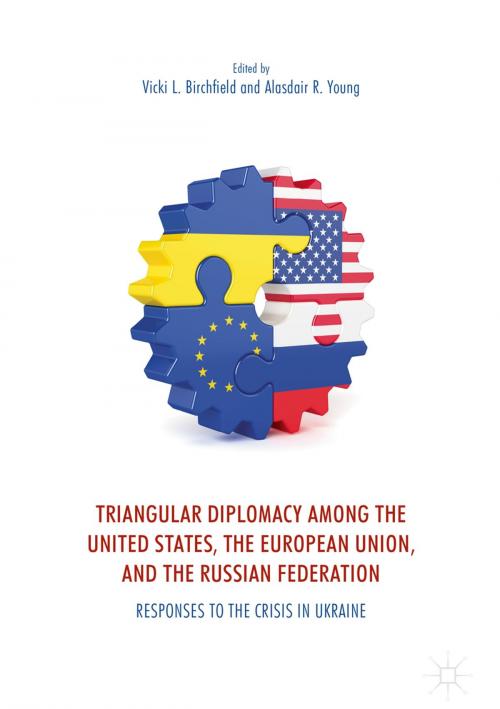Triangular Diplomacy among the United States, the European Union, and the Russian Federation
Responses to the Crisis in Ukraine
Nonfiction, Social & Cultural Studies, Political Science, International, International Relations, Government| Author: | ISBN: | 9783319634357 | |
| Publisher: | Springer International Publishing | Publication: | September 15, 2017 |
| Imprint: | Palgrave Macmillan | Language: | English |
| Author: | |
| ISBN: | 9783319634357 |
| Publisher: | Springer International Publishing |
| Publication: | September 15, 2017 |
| Imprint: | Palgrave Macmillan |
| Language: | English |
This book examines the crisis in Ukraine through the lens of “triangular diplomacy,” which focuses on the multiple interactions among the European Union, the United States and Russia. It is explicitly comparative, considering how the US and EU responded to ostensibly the same crisis. It also adopts a “360-degree” perspective, focusing on how the US and EU interacted in their dealings with Russia, and how Russia and Ukraine have responded. Chapters focus on each of the four protagonists – the EU, the US, Russia and Ukraine – and on key, cross-cutting aspects of the crisis – sanctions, international law and energy. The book thus contrasts a conventional, if exceptional, great power – the US – with a very non-traditional foreign policy actor – the EU. It would be suitable for both undergraduate and graduate courses on the EU’s external policies and engagement in world affairs, EU-US relations, EU-Russia interactions, or regional security issues.
This book examines the crisis in Ukraine through the lens of “triangular diplomacy,” which focuses on the multiple interactions among the European Union, the United States and Russia. It is explicitly comparative, considering how the US and EU responded to ostensibly the same crisis. It also adopts a “360-degree” perspective, focusing on how the US and EU interacted in their dealings with Russia, and how Russia and Ukraine have responded. Chapters focus on each of the four protagonists – the EU, the US, Russia and Ukraine – and on key, cross-cutting aspects of the crisis – sanctions, international law and energy. The book thus contrasts a conventional, if exceptional, great power – the US – with a very non-traditional foreign policy actor – the EU. It would be suitable for both undergraduate and graduate courses on the EU’s external policies and engagement in world affairs, EU-US relations, EU-Russia interactions, or regional security issues.















